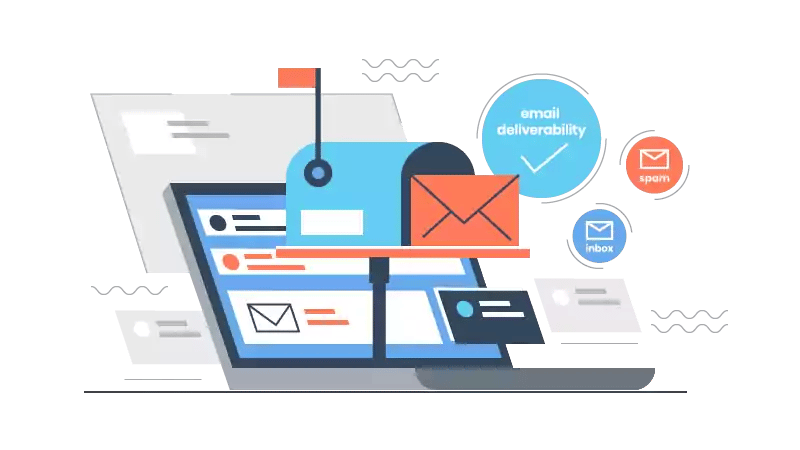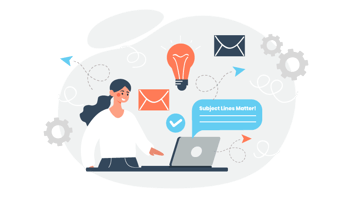What is Email Marketing, and Why Does It Matter?
Today, businesses constantly seek innovative ways to reach and engage their target audience. One powerful tool that has stood the test of time is email marketing. Despite the rise of social media and other digital channels, email remains a highly effective way to build relationships, drive sales, and increase brand loyalty.
Whether you're a seasoned marketer or just starting out, understanding the power of email marketing can significantly improve your overall strategy.

What is Email Marketing?
Email marketing involves sending targeted emails to a list of subscribers to promote a product or service or build brand loyalty. It's a powerful tool that allows businesses to communicate directly with their audience, nurture relationships, and drive conversions.
Unlike traditional marketing methods that often rely on one-way communication, email marketing provides a direct channel for businesses to reach their audience and engage in two-way conversations. By collecting email addresses from interested individuals, businesses can create a targeted list of subscribers and send personalized messages that are more likely to resonate.
The key components of email marketing include:
-
Email list: A database of individuals who have opted in to receive emails from your business.
-
Email content: The messages you send to your subscribers, which can include newsletters, promotional offers, product updates, and more.
-
Email campaigns: A series of emails sent to achieve a specific goal, such as increasing sales, generating leads, or building brand awareness.
These key components work together to create a powerful marketing tool with numerous benefits for businesses:
-
High ROI: Email marketing often delivers a high return on investment, making it a cost-effective way to reach your audience.
-
Targeted reach: You can segment your email list based on demographics, interests, or behavior to send highly relevant messages.
-
Measurable results: Email marketing provides valuable analytics, allowing you to track key metrics like open rates, click-through rates, and conversions.
-
Building relationships: Regular email communication helps build trust and loyalty with your audience.
-
Nurturing leads: Email marketing can nurture leads through the sales funnel and convert them into customers.
Beyond these fundamental benefits, email marketing is an extremely effective marketing tool. From driving sales and generating leads to building brand loyalty and fostering customer relationships, email marketing offers a multitude of benefits that can significantly impact your organization's success.
Why Does Email Marketing Matter?
Email marketing has endured, proving its enduring relevance in the ever-evolving digital landscape. Despite the emergence of newer communication channels, email remains a highly effective tool for businesses to reach and engage their target audience.
Brand Advocacy and Awareness
Regular email communication is a powerful tool for keeping your brand at the forefront of your audience's mind. Consistent email newsletters can reinforce your brand identity, increase brand recognition, and improve recall. One study found that brand awareness campaigns via email can increase brand recognition by a substantial 81%.
One of the most valuable outcomes of successful email marketing is the creation of brand advocates. By fostering genuine connections with your audience through personalized and informative emails, you can cultivate a loyal customer base that is willing to recommend your brand to others. Word-of-mouth marketing from satisfied customers is a powerful force that can significantly boost your business's growth.
Targeted Messaging
One key reason for its continued importance is its ability to deliver targeted messages. Unlike other marketing channels that often cast a wide net, email allows businesses to segment their audience based on demographics, interests, or behavior. This segmentation enables them to send highly relevant and personalized content that resonates with their subscribers.
Control and Flexibility
Moreover, email marketing offers a high degree of control and flexibility. Businesses can easily track key metrics like open rates, click-through rates, and conversions, providing valuable insights for optimizing their campaigns. This data-driven approach allows for continuous improvement and ensures email marketing efforts align with overall business goals.
Relationship Building and Customer Retention
In addition to its practical benefits, email marketing also plays a crucial role in building customer relationships. By providing valuable content, offering exclusive deals, and staying top of mind, businesses can foster loyalty, encourage repeat purchases, and create brand advocates.
Personalized emails, tailored to individual preferences and interests, can create a sense of loyalty and encourage repeat business. Additionally, triggered emails, automatically sent based on customer behavior, can provide a highly personalized and timely experience. According to Epsilon, triggered emails generate transaction rates that are six times higher than regular broadcasts.
Increasing Sales and Revenue
Well-executed email marketing campaigns can directly drive sales and increase revenue. By promoting specific products, highlighting promotions and discounts, and providing compelling calls to action, you can encourage customers to make purchases. Shopify reports that email marketing generates an average revenue of $42 for every $1 spent, making it a highly effective channel for driving sales.
Ultimately, email marketing's importance lies in its ability to deliver tangible results. Whether it's driving sales, generating leads, or building brand awareness, email marketing offers a proven and effective strategy for businesses of all sizes.
The Power of Permission-Based Marketing
In the digital age, where consumers are inundated with advertisements, permission-based marketing has emerged as a more effective and ethical approach. Unlike traditional advertising, which often involves unsolicited messages, permission-based marketing relies on individuals voluntarily opting in to receive communications from a business. This approach fosters a sense of trust and allows businesses to build stronger relationships with their audience.
Email marketing is a prime example of permission-based marketing. By building an email list of subscribers who have actively chosen to receive your emails, you're establishing a direct line of communication with a receptive audience. This allows you to deliver targeted messages that are relevant to their interests and needs, increasing the likelihood of engagement and conversion.
-
To build a thriving email list, it's essential to employ ethical and effective strategies. Offering valuable content, such as exclusive discounts, industry insights, or helpful resources, can incentivize individuals to sign up for your emails. Creating a clear and compelling signup form can make it easy for potential subscribers to join your list.
-
Once you've built a substantial email list, segmentation becomes crucial for maximizing its effectiveness. By dividing your list into smaller groups based on demographics, interests, or purchase history, you can tailor your messages to specific segments. This personalization ensures that your emails resonate with your audience and deliver better results.
-
Finally, data privacy compliance is essential in the age of increasing regulations. The General Data Protection Regulation (GDPR) and the California Consumer Privacy Act (CCPA) have introduced stricter guidelines for handling personal data. By obtaining clear consent from subscribers and allowing them to unsubscribe at any time, you can demonstrate your commitment to data privacy and build trust with your audience.
Permission-based marketing is a powerful approach that allows businesses to build stronger relationships with their audience and deliver targeted, effective messages. By focusing on building your email list, segmenting your subscribers, and adhering to data privacy regulations, you can harness the full potential of email marketing and drive your business forward.
Crafting Compelling Email Marketing Content
To maximize the effectiveness of your email marketing campaigns, it's essential to create content that is both engaging and persuasive. Here are some key strategies to consider:
How to Craft a Strong Marketing Email
Enticing Subject Lines
The subject line is often the first thing your subscribers see, so it's crucial to make it compelling. A strong subject line should be concise, clear, and intriguing enough to entice recipients to open your email. Here are some tips for crafting effective subject lines:
-
Be specific: Clearly state what the email is about.
-
Use strong action verbs: Create a sense of urgency or curiosity.
-
Personalize your subject lines: Use the recipient's name or reference their interests.
-
Test different options: A/B testing can help determine which subject lines perform best.
Compelling Preheaders
The preheader text is a short snippet that appears below the subject line in some email clients. It provides additional context and can help increase open rates. A well-written preheader should complement your subject line and entice recipients to click.
Content is Crucial
The content of your email is just as important as the subject line. Your goal should be creating valuable, engaging content that resonates with your audience. This could include:
-
Industry news and updates: Keep your subscribers informed about your field's latest trends and developments.
-
Product or service information: Highlight new features, benefits, or promotions.
-
Educational resources: Offer tips, tutorials, or guides that provide value to your audience.
-
Stories and anecdotes: Share personal stories or anecdotes related to your brand.
-
Customer testimonials: Showcase positive feedback from satisfied customers.
Visual Appeal Matters
Visual elements can enhance the engagement and readability of your emails. Consider using:
-
High-quality images: Choose images that are relevant to your content and visually appealing.
-
Infographics: Use infographics to present complex data in a visually engaging way.
-
Videos: Incorporate videos to add a multimedia element to your emails.
-
Consistent branding: Maintain a consistent look and feel throughout your emails.
Clear CTAs
A clear and compelling call to action (CTA) tells your subscribers exactly what you want them to do. Your CTA should be prominent, easy to find, and encourage a specific action, such as:
-
Clicking a link to visit a landing page.
-
Downloading a resource like an ebook or whitepaper.
-
Making a purchase.
-
Replying to the email.
Measuring The Success of Your Email Marketing Campaigns
To effectively measure the performance of your email marketing efforts, it's essential to track key metrics that provide insights into your campaigns' success. Here are some of the most important metrics to consider:
-
Open rates: The percentage of recipients who open your email. A high open rate indicates that your subject line and preheader are compelling.
-
Click-through rates (CTRs): The percentage of recipients who click on a link in your email. A high CTR suggests that your content is relevant and engaging.
-
Conversion rates: The percentage of recipients who take a desired action, such as making a purchase or signing up for a newsletter.
-
Unsubscribe rates: The percentage of recipients who opt out of your email list. While a certain level of unsubscribes is normal, a high unsubscribe rate may indicate that your content is not relevant or engaging.
By tracking these metrics, you can gain valuable insights into your email marketing campaigns' effectiveness and identify improvement areas.
Optimizing Your Email Marketing Campaigns
To optimize your campaigns based on these metrics, consider the following tips:
-
A/B testing: Experiment with different subject lines, content, and CTAs to determine what works best for your audience.
-
Segmentation: Divide your email list into segments based on demographics, interests, or behavior to send more targeted and relevant messages.
-
Personalization: Use personalization to create a more personalized experience for your subscribers.
-
Timing: Experiment with different send times to determine when your audience will likely open and engage with your emails.
-
Mobile optimization: Ensure your emails are optimized for mobile devices, as many emails are opened on smartphones and tablets.
-
Continuously analyze and improve: Review your email marketing metrics regularly and adjust your campaigns based on the insights you gain.
By following these strategies, you can optimize your email marketing campaigns to achieve better results and maximize your return on investment.
Elevate Your Business with Email Marketing
Email marketing remains a powerful tool for businesses of all sizes. By understanding its key components, benefits, and best practices, you can leverage them to drive sales, build brand awareness, and foster customer loyalty.
Remember, the success of your email marketing campaigns depends on your ability to create compelling content, segment your audience effectively, and continuously measure and optimize your results. By following the strategies outlined in this blog, you can unlock the full potential of email marketing and achieve your business goals.
Ready to take your email marketing to the next level? Aspiration Marketing offers expert guidance and services to help you create effective email campaigns that drive results.
Contact us today to learn more about how we can help you achieve your marketing objectives!
This content is also available in:
- Deutsch: Was ist E-Mail-Marketing, und warum ist es wichtig?
- Español: ¿Qué es el marketing por correo electrónico y por qué es importante?
- Français: Qu'est-ce que le marketing par email et quelle est son importance ?
- Italiano: Cos'è l'email marketing e perché è importante?
- Română: Ce este e-mail marketingul și de ce este important?
- 简体中文: 什么是电子邮件营销,它为何重要?









Leave a Comment